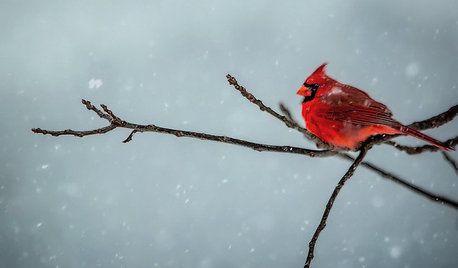Red Spider attack?
Liz_Gardiner
20 years ago
Related Stories

GARDENING GUIDESBackyard Birds: Northern Cardinals in the Snow, and Other Red Birds
Brilliant crimson feathers make these friends stand out in a crowd
Full Story
COLORWhy My Son’s Room Will Be Red: An Expert Weighs In on Colors for Baby
Historical facts, trend recaps and enthusiastic support for painting your nursery any darn color you like
Full Story
DECORATING GUIDESKnot Again! Macrame Is Back
It's happened. A craft that typified 1970s style (the owls, the spider plants!) is back, but better
Full Story
RED FOLIAGEGreat Design Plant: 'Shenandoah' Switchgrass
With jewel-like flowers that belie its tough nature, this warm-season grass is wonderful in a fall garden vignette
Full Story
GARDENING GUIDESGreat Design Plant: Knock Out Roses
As glorious as their high-maintenance kin for a fraction of the work, Knock Out roses make even beginners look like garden stars
Full Story
COLOR4 Hot Color Trends to Consider for 2013
Bring some zing to your rooms for the new year, with high-energy shades that open the eyes and awaken the spirit
Full Story
GARDENING GUIDESGreat Design Plant: Northern Bush Honeysuckle, a Bronze Beauty
It helps control erosion and takes sun or shade. The butterflies love it. But the best part of this shrub may be the vivid foliage
Full Story
GARDENING GUIDESGreat Design Plant: Lonicera Sempervirens
Grow this long-blooming, flashy flowering vine to cover a fence or arbor and attract hordes of hummingbirds all season long
Full Story
GARDENING GUIDESThese Hummingbird-Attracting Native Plants May Surprise You
These flowers, vines and shrubs offer shelter and food supplies that keep hummingbirds around longer
Full Story
KITCHEN STORAGEGet It Done: How to Clean Out the Pantry
Crumbs, dust bunnies and old cocoa, beware — your pantry time is up
Full Story





rob_peace
Mike Hardman
Related Professionals
New Bedford Landscape Architects & Landscape Designers · Windham Landscape Architects & Landscape Designers · Wrentham Landscape Architects & Landscape Designers · Ballenger Creek Landscape Architects & Landscape Designers · Ferndale Landscape Architects & Landscape Designers · Milwaukee Landscape Architects & Landscape Designers · Vernon Hills Landscape Architects & Landscape Designers · Caldwell Landscape Contractors · Danvers Landscape Contractors · Fort Wayne Landscape Contractors · Fort Worth Landscape Contractors · Maywood Landscape Contractors · Sugar Hill Landscape Contractors · Thornton Landscape Contractors · Tigard Landscape ContractorsLiz_GardinerOriginal Author
nathalie
Mike Hardman
Liz_GardinerOriginal Author
Mike Hardman
Liz_GardinerOriginal Author
clive